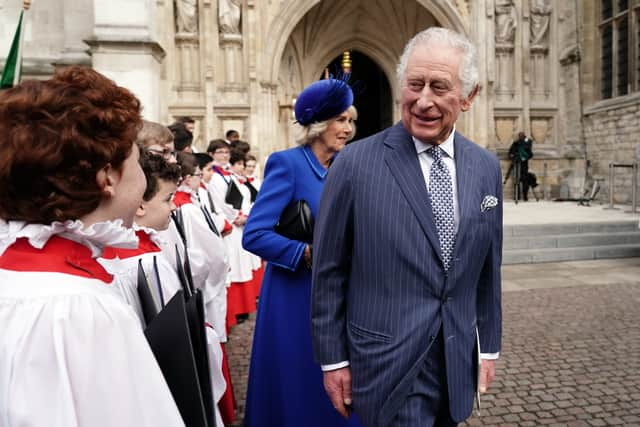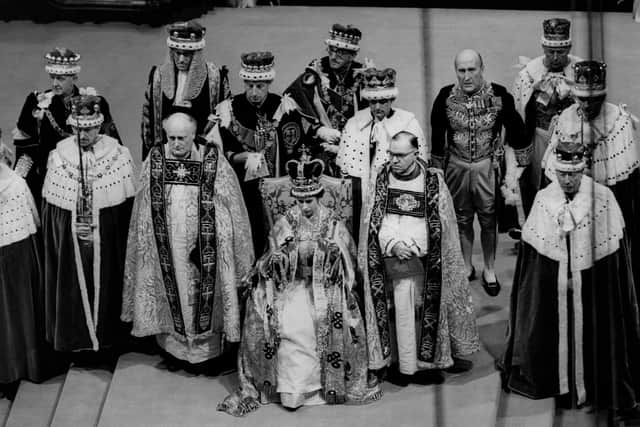What will King Charles say during Coronation oath? Text, what happens, how oath has changed - significance
and live on Freeview channel 276
King Charles will take the coronation oath as part of his crowning ceremony at Westminster Abbey next month.
The monarch ascended to the throne following the death of Queen Elizabeth II in September last year. However he will be officially coronated alongside Camilla, Queen Consort, at a service on Saturday, 6 May.
Advertisement
Hide AdAdvertisement
Hide AdThe oath taken by Charles III will be updated to reflect the change in realms over which the British sovereign is monarch, but there appears to be no suggestion of the addition of a multi-faith or religious tolerance element. The Government confirmed in a written statement to Parliament that some of the wording will be amended because the number of Commonwealth realms has “evolved” since 1953.
The King and Camilla will travel to Westminster Abbey from Buckingham Palace on Saturday morning. Following the coronation, they will take part in a procession in the Gold State Coach.
What is the text of the coronation oath?
The full text of King Charles III’s coronation oath has now been revealed ahead of the ceremony on 6 May. Previously the Government confirmed in a written statement to Parliament that some of the wording will be amended because the number of Commonwealth realms has “evolved” since 1953.


The full text is as follows:
Archbishop of Canterbury:
Your Majesty,
the Church established by law, whose settlement you will swear to maintain, is committed to the true profession of the Gospel, and, in so doing, will seek to foster an environment in which people of all faiths and beliefs may live freely. The Coronation Oath has stood for centuries and is enshrined in law.
Are you willing to take the Oath?
The King:
I am willing.
Advertisement
Hide AdAdvertisement
Hide AdThe King places his hand on the Bible, and the Archbishop administers the Oath.
Archbishop of Canterbury:
Will you solemnly promise and swear to govern the Peoples of the United Kingdom of Great Britain and Northern Ireland, your other Realms and the Territories to any of them belonging or pertaining, according to their respective laws and customs?
The King:
I solemnly promise so to do.
Archbishop of Canterbury:
Will you to your power cause Law and Justice, in Mercy, to be executed in all your judgments?
The King:
I will.
Archbishop of Canterbury:
Will you to the utmost of your power maintain the Laws of God and the true profession of the Gospel? Will you to the utmost of your power maintain in the United Kingdom the Protestant Reformed Religion established by law? Will you maintain and preserve inviolably the settlement of the Church of England, and the doctrine, worship, discipline, and government thereof, as by law established in England? And will you preserve unto the Bishops and Clergy of England, and to the Churches there committed to their charge, all such rights and privileges as by law do or shall appertain to them or any of them?
The King:
All this I promise to do.
Advertisement
Hide AdAdvertisement
Hide AdThe things which I have here before promised I will perform and keep. So help me God.
Archbishop of Canterbury:
Your Majesty, are you willing to make, subscribe and declare to the statutory Accession Declaration Oath?
The King:
I am willing.
The King:
I Charles do solemnly and sincerely in the presence of God profess, testify, and declare that I am a faithful Protestant, and that I will, according to the true intent of the enactments which secure the Protestant succession to the Throne, uphold and maintain the said enactments to the best of my powers according to law.
A short anthem is sung during the signing of the Oath.
What happens during the coronation oath-taking ceremony?
The King will return to the coronation chair and the Archbishop of Canterbury will stand before him and administer the oath. The oath will be administered in the form of the Archbishop asking the King questions.
Advertisement
Hide AdAdvertisement
Hide AdFor reference, in 1953 Elizabeth II was asked at one point: “Will you to the utmost of your power maintain the Laws of God and the true profession of the Gospel? Will you to the utmost of your power maintain in the United Kingdom the Protestant Reformed Religion established by law?”
Following the oath, the King will then be annointed with the holy oil, invested with regalia and crowned.
How has the coronation oath evolved over time in the British monarchy?


The oath has changed and evolved throughout the centuries. The Coronation Oath Act 1688 replaced the previous oath prior to the coronation of William III and Mary II.
King Charles’ coronation oath is to be updated to reflect the change in realms over which the British sovereign is monarch, but there appears to be no suggestion of the addition of a multi-faith or religious tolerance element. In the 1990s there was speculation the oath would be altered to meet the-then Prince of Wales’s “vision of his spiritual role as ‘Defender of Faith’”.
Advertisement
Hide AdAdvertisement
Hide AdBut Chancellor of the Duchy of Lancaster Oliver Dowden has announced: “Some updating to the wording of the oath is required to reflect the current position as regards the realms and territories, whose number has evolved since the coronation of Her Majesty Queen Elizabeth II, and who will be referred to collectively.” He added that legislation was not being used to update the oath, emulating the approach explained by Sir Winston Churchill for the late Queen’s coronation in 1953.
Dr Morris, of the Constitution Unit at University College London, said: “They’ve chosen not to give themselves enough time to review the oath because they could have done had they wished to do so. Amending the oath by statute is a very serious matter. You get all sorts of people coming out of the woodwork.”
He added: “They’re not doing anything ambitious. They explain the only alterations they are making are because of developments elsewhere.”
The Constitution Unit of UCL suggested possible amendments to the oath in the wake of the Queen’s death. They included the proposed: “Will you to your power maintain tolerance and freedom, including religious tolerance; and will you seek to uphold the rights of all your Peoples to observe their different religions and beliefs without fear of persecution?”
Advertisement
Hide AdAdvertisement
Hide AdThe King has long been a passionate advocate of religious tolerance and caused controversy in 1994 when he spoke of his desire to become “Defender of Faith” rather than “Defender of the Faith” as monarch – raising the prospect of a major change in the ancient relationship between the Church of England and the monarchy.
Why is the coronation oath important for the British constitution?
The Coronation Oath is a legal obligation, although a monarch can carry out duties known as “royal functions” before they have taken it. King Edward VIII did not take the Coronation Oath as he was never crowned, but he nevertheless discharged royal functions during his 325-day reign.
On Parliament’s website it explains: “The Coronation Oath Act 1688 provided for an oath to be taken by King William III and Queen Mary II and all future monarchs. This replaced a previous oath, which the Parliament of England believed had come to be “framed in doubtful Words and Expressions”.
The new oath was in three parts, and bound the monarch to:
- rule according to laws agreed “in Parliament”, therefore limiting their power following the “Glorious Revolution”
- cause law, justice and mercy to be executed in their judgments; and
- maintain “the Protestant Reformed Religion Established by Law” (ie, the Church of England)
The website continues: “Section 3 of the 1688 Act provided the words to be used in the oath, while Section 4 stated that the oath was to be read to the monarch by the Archbishop of Canterbury or York, or another Bishop appointed for that purpose.
Advertisement
Hide AdAdvertisement
Hide Ad“Each part of the oath is framed as a question to the monarch. Having answered all three, the monarch kisses a Bible and declares: ‘The things which I have here before promised I will perform and keep so help me God.’
“Until 1707, the monarch also had to swear a Scottish Coronation Oath in their separate capacity as King or Queen of Scots. After the 1707 Union, the (English) Coronation Oath Act 1688 was extended to Scotland as part of the new Kingdom of Great Britain. Thereafter, there has been only one statutory Coronation Oath for British monarchs.”
Comment Guidelines
National World encourages reader discussion on our stories. User feedback, insights and back-and-forth exchanges add a rich layer of context to reporting. Please review our Community Guidelines before commenting.